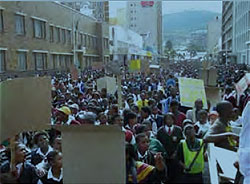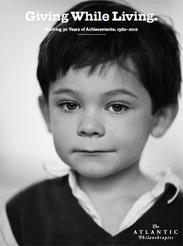Defending Democracy and Delivering on the Constitution
Resource type: Grantee Story

Equal Education student members march for better school infrastructure. Photo: Equal Education
Throngs of students protested outside the South African Parliament in Cape Town on a sunny afternoon in February 2011. Wearing green T-shirts and carrying handscrawled signs, they set up an outdoor classroom complete with desks and chairs.
The students, members of Atlantic grantee Equal Education, were protesting against the deplorable conditions of nearly 400 schools in the Eastern Cape constructed from mud and many more that lack running water and toilets. The students demanded government action to ensure every child’s right to education by guaranteeing a safe, clean learning environment.
For these activists, the squalor of the mud schools exemplifies the glaring gap between the reality of daily life and the rights promised by their constitution, one of the world’s most progressive. Its preamble envisions “a society based on democratic values, social justice and fundamental human rights.” Yet the poorest and most disadvantaged South Africans are too often denied their rights.
Because rights and democracy are at the core of Atlantic’s health and human rights objectives, the foundation has supported grantees working to uphold the constitution and defend democracy since its work began in the country in the early 1990s. Since 2009, there have been additional investments of ZAR23.8 million ($3 million) toward this goal.
At a time when the constitution is under attack, grantees have made great strides. The Constitutional Court ruled in favour of gay marriage, thanks to litigation by the Lesbian and Gay Equality Project. The court also reversed the Communal Land Rights Act, securing access to land ownership and improving the livelihoods of 16 million women, thanks to the Legal Resources Centre. Recently, the public interest law centre SECTION27 (formerly the AIDS Law Project) successfully litigated to require the Limpopo and Mpumalanga governments to provide textbooks for primary schools.
– United States Supreme Court Justice Ruth Bader Ginsburg
Advocacy efforts have also paid off. The South African National Editors Forum and the Right2Know Campaign pressured the government to abandon plans for a Media Appeals Tribunal, which would have compromised the independence of the press; and the Social Justice Coalition pushed the Cape Town City Council to provide one toilet to every five households in informal settlements around the city, an improvement over the current 1:12 ratio. It also agreed to provide janitors to clean and repair toilets.
And, the students’ protest brought results. The Constitutional Court ordered the Eastern Cape government to replace mud schools with proper structures, in response to the Legal Resources Centre’s litigation, with support from Equal Education. The government subsequently made ZAR8.2 billion ($1 billion) available for school improvements. Building on this victory, Equal Education continues to seek to ensure that all South Africans have access to a quality education.
Giving While Living: Marking 30 Years of Achievements: 1982–2012
> Read more stories of impact in our 30th anniversary publication
Lesbian and Gay Equality Project, Legal Resources Centre through Legal Resources Trust, and AIDS Law Project (now SECTION27) via the University of The Witwatersrand Foundation are also Atlantic grantees working to uphold the constitution and defend democracy in South Africa.
